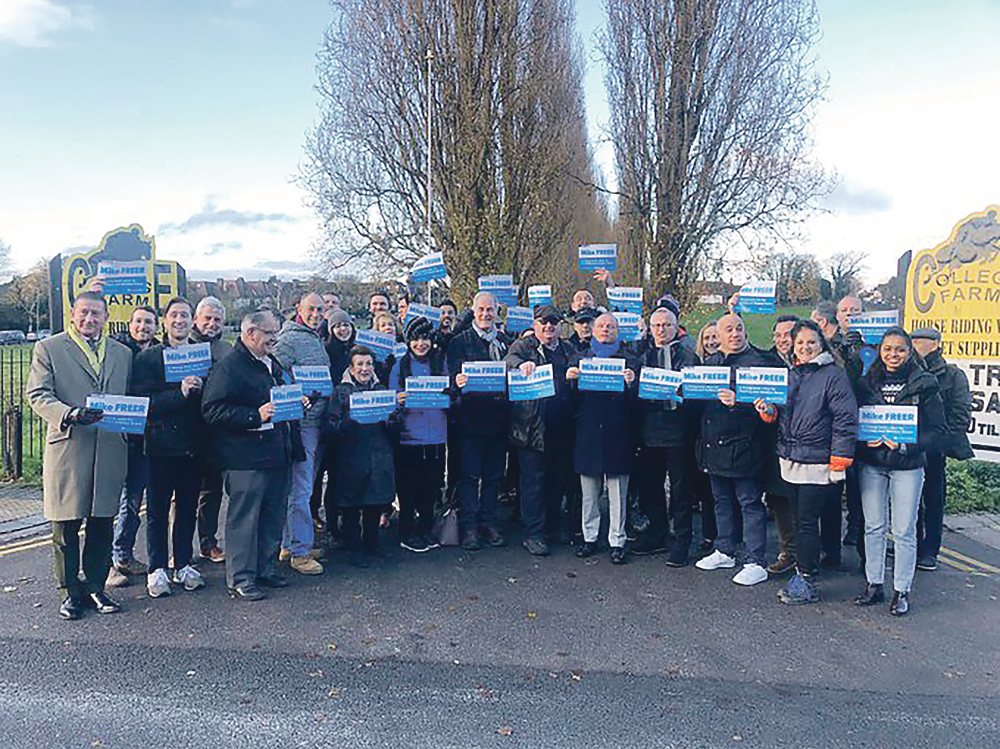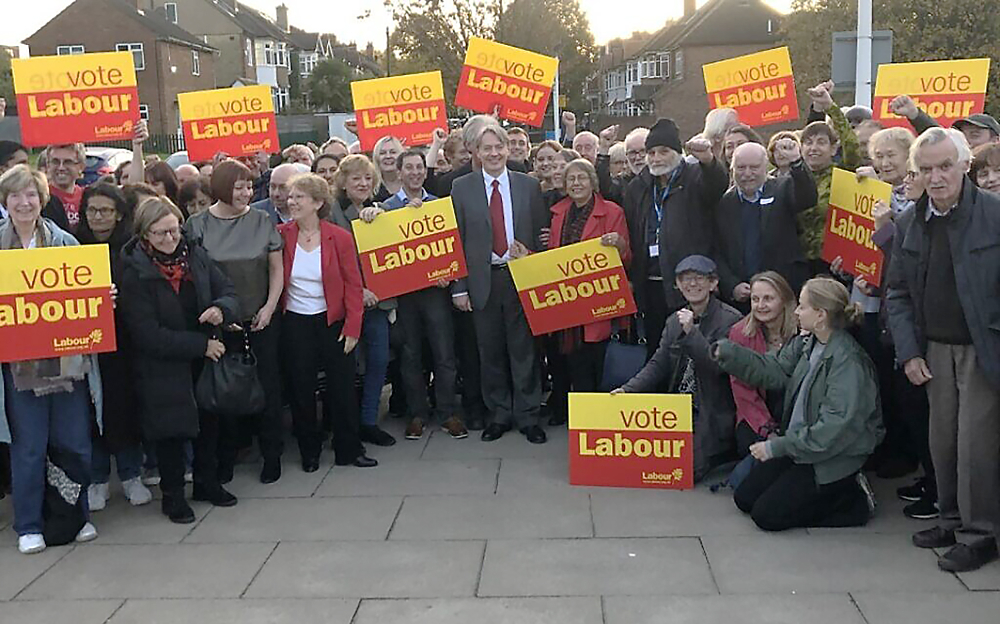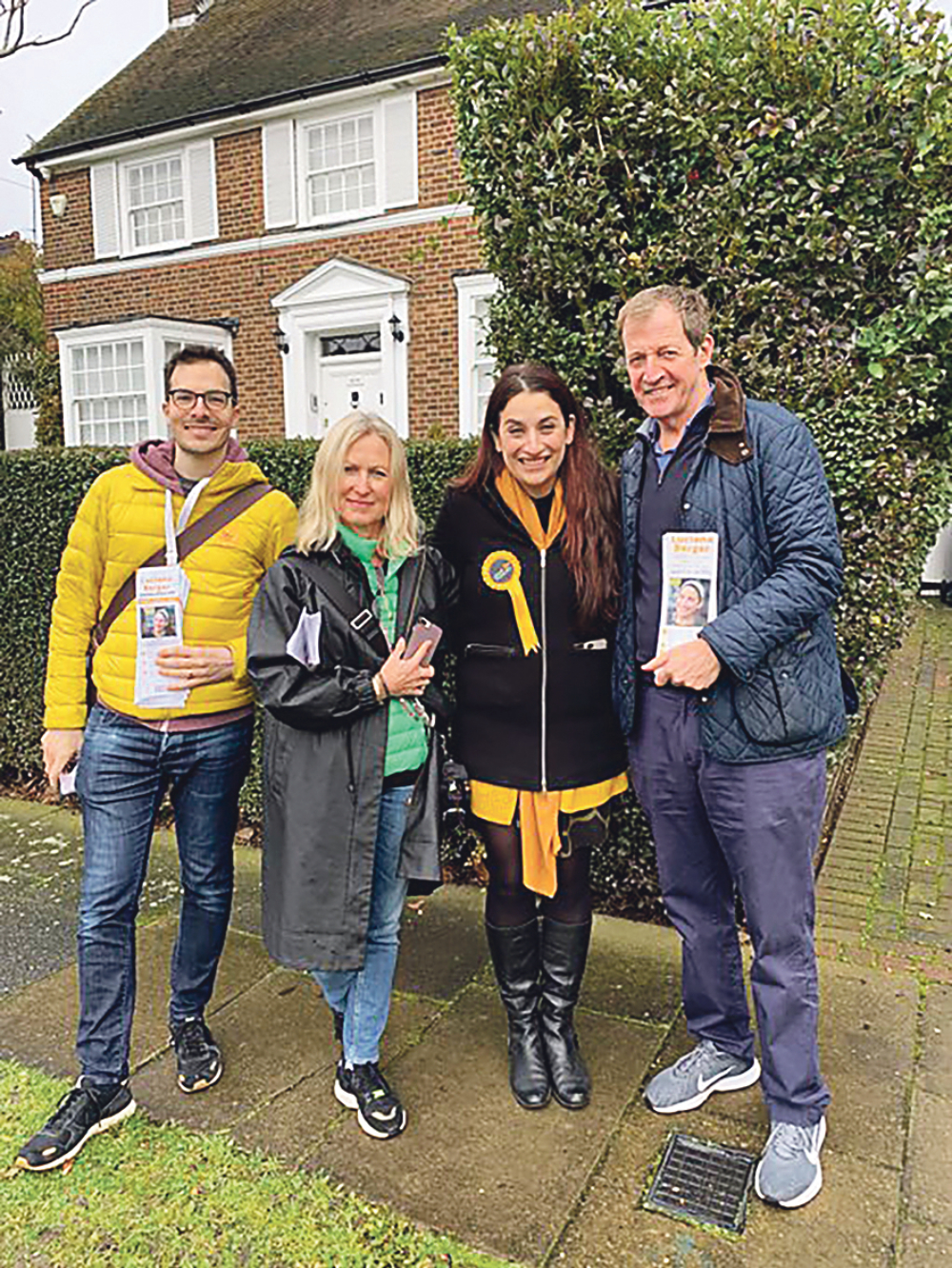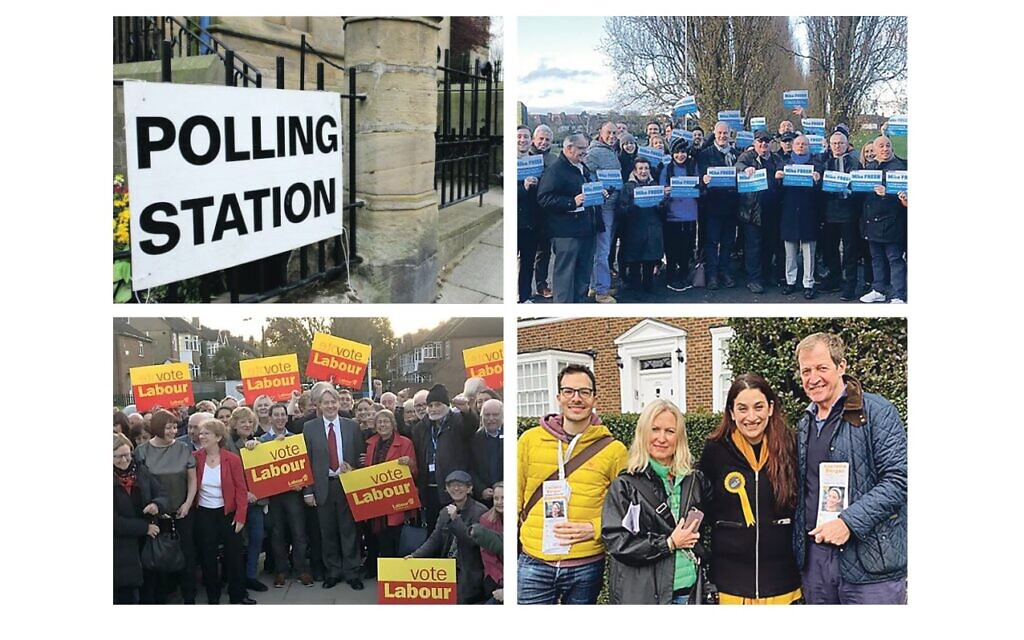General Election 2019: Bellwether battle in the heart of the Bagel Belt
With just a few days before Brits go to the polls, the fight for Finchley and Golders Green hots up with the issues of Brexit and antisemitism featuring heavily
Probably the flashpoint constituency in the whole of London, if not nationally, is Finchley and Golders Green, part of which was once the fiefdom of Prime Minister Margaret Thatcher.
For in the manicured avenues of Hampstead Garden Suburb and the occasionally grim council properties of Cricklewood, a fierce three-way street battle is being fought. Finchley and Golders Green has the highest Jewish community vote in the country, and 68.9 percent of the electorate voted Remain in the referendum.
And fighting to retain his seat is Conservative Mike Freer, a government whip who campaigned for Remain but has since decided that Prime Minister Boris Johnson’s deal is one that can effectively take Britain out of Europe.
Get The Jewish News Daily Edition by email and never miss our top stories Free Sign Up
Freer, an MP since 2010, narrowly won in 2017, beating Labour’s Jeremy Newmark by a slender 1,657 majority. The Lib Dems came a very low third in that election with 3,463 votes.
But there have been political convulsions since 2017 and the dynamic has changed. Now, in the formidable person of Luciana Berger, the former Labour MP for Liverpool Wavertree, the Lib Dems have a glamorous candidate with a strong profile within the Jewish community.
And it is the long-time deputy leader of Barnet Council’s Labour group, Ross Houston, who may well be struggling, because of the Corbyn factor and many Jewish voters’ reluctance to give him their support.
Read more – Meet the candidates!
- Knock, knock, knocking on Hendon’s doors
- Who’ll win Herts and minds?
- The battle for Hampstead and Kilburn – the ‘oddball seat’
- Why Ilford voters are ‘agonising’ over election day
- Which party will hit the mark in Harrow East?
All three candidates have been getting the big guns out to support them: Tulip Siddiq, the Remain-supporting incumbent of nearby Hampstead and Kilburn, turned up at Houston’s launch, while Chancellor Sajid Javid and former premier Theresa May backed Freer. Berger had different support: she was accompanied on doorstep canvassing by the wily former New Labour spin doctor Alastair Campbell, thrown out of Labour for saying he would vote LibDem; and, rather more starrily, singer Fergal Shearkey and actor Hugh Grant. Houston has been endorsed by Shadow front-bencher Sir Keir Starmer and London Mayor Sadiq Khan.
Freer, it would be fair to say, is less than happy at being opposed by Berger. On a sunny day in Finchley Central, with the phones in the local Conservative Party offices bleeping repeatedly, Freer, with justification, presents himself as a warm friend of the Jewish community.
He is certainly that, an active member of the Conservative Friends of Israel, and a frequent and familiar attender at any number of local communal events. But he says flatly: “If you want to fight antisemitism, why not stand in a seat where you [Berger] can take out an antisemite, take out the Corbynistas?”
It’s an argument which was made in 2017, when Jeremy Newmark and Mike Katz, both active members of the Jewish community, stood in the adjoining seats of Finchley and Golders Green and Hendon. But Freer — who says this election does not feel that different from 2017 — makes the point even more strongly today.

“The threat here”, he says, “is do the LibDems siphon off votes from me to allow the Labour candidate to go through the middle?” And, he says, “we need to increase the number of people who will stand up for the Jewish community, not simply replace them. It’s not a zero-sum game. There are opportunities to take out Corbynistas who have slender majorities and if you want to rid the Labour Party of antisemitism, then we need to increase the number of people in the Labour Party who will make that fight. But overall, we need to increase that number as a total — why aren’t people taking the battle to people like Emma Dent Coad [in Kensington]?”
It’s “lazy politics”, Freer believes, “saying, let’s go to Finchley and Golders Green because it’s got a big Jewish vote or a big Remain vote. The idea that the community is homogenous and will vote one way just because of a candidate’s faith is not particularly accurate”.
Though he says otherwise, Freer may be rattled: he has made a point of contacting former residents who now live in Israel to see if they might vote in this election (an entitlement given to people for up to 15 years after they leave the UK). “It’s not chasing votes”, he insists, “it’s democracy. There are over 1,000 overseas votes registered in this constituency, from America, Japan, Europe… why shouldn’t I ask for that support? I have had positive feedback on this.”
Any candidate who says he or she is not anxious about an election “is lying to you”, says Freer. He says he is a fighter and — in the unlikely event that he were to become Prime Minister — says he would put a great deal of effort into harmonising social care and “putting a lot of money into dementia research”.
One clue to what makes Mike Freer tick comes in his impassioned response to the Holocaust. He’s visited Auschwitz and “come away angry” at denial. But, as a gay man, he is painfully aware that “if the transports [to the concentration camps] were happening today, I’d be on those trains”.
Like Freer, whom he knows well from shared days on Barnet Council, his Labour opponent, Ross Houston, is not from London but has lived in the constituency for more than 20 years and is keen to stress both his familiarity with the Jewish community, and with local issues.

He has served as deputy leader of the Labour group on Barnet Council, and was nominated quite late in the day by the constituency party, which was keen to have a local nominee.
Glasgow-born and raised in Kirkcaldy, he describes himself as “a passionate Remainer”. Though muttering cheerfully about “whose idea was it to hold an election in this weather”, Houston and his team nevertheless knocked on 1,800 doors in Finchley and Golders Green the weekend before speaking to the Jewish News. His feedback, he says, “is our core vote is holding up”.
Houston is the antithesis of a Corbynite candidate and would, if pressed, describe himself as a follower of Gordon Brown, the last Labour prime minister. He is a specialist in housing, both in local government and in his own job. His policies, he says, “are in line with those of the Jewish Labour Movement”, and it was important for the party to have someone local as their candidate whose beliefs would be in accord with theirs, “calling out antisemitism wherever we see it”.
Naturally, he says, the issue comes up repeatedly on the doorstep. “It’s clearly a difficult election this time and there is a different dynamic with the Lib Dem push for the seat. A couple of weeks in, I feel more confident. Perhaps the Lib Dems have chosen the wrong seat [to contest].”
Houston — who has visited Israel and encountered Blue and White leader Benny Gantz on his last trip — has strong views on the question of campaigning to put Jeremy Corbyn in Downing Street. “It’s not the predominant issue — a number of our left-wing Jewish members are in fact very pro-Corbyn. What does come up a lot is Brexit and school cuts. But my position is very clear: I think the party needs to implement the EHRC recommendations in full, and I welcome that.
“When cases [of antisemitism] have been badly handled, I want to know about it and I want it dealt with, there have to be consequences. It’s an opportunity not just for our party but for other parties, good practice in how they handle these cases. I think it’s ridiculous that we have ended up with the perception of not dealing with these cases, and for the party, we really need to have a completely independent process. .”
On Brexit, Houston is a veteran Remain campaigner but says the Lib Dem policy on stopping Brexit is “counter-productive. We will win a People’s Vote and enough people have changed their views three years on. If we revoke, any Leave voter will feel their vote has been stolen.”
He says it is “a great shame” that Luciana Berger left the Labour Party, but the candidate herself seems to have no regrets, expressing great happiness at the reception she is getting in the constituency — and praising her “wonderful team”. Berger famously left Labour in February this year, citing relentless antisemitism and insisting that the party had actually left her. She was a founding member of the new, but short-lived independent group of Change MPs, before joining Jo Swinson’s Liberal Democrats in September and becoming the party’s spokesperson for health, wellbeing and social care.

So it has been a rapid trajectory for Berger, though she is of course a Commons veteran, having been Labour’s MP for Liverpool Wavertree since 2010. She has a high personal recognition factor, not just among the Jewish community, and has local roots. “My parents had their first marital home here and it’s where my home is. I know the constituency very well.”
Berger is a fierce opponent of Brexit and she thinks, judging by the way it comes up in her canvassing encounters, that her opposition is what may swing it for a Lib Dem victory in this election. “It is a very real challenge that the country faces.” She is absolutely convinced that her party leader, Jo Swinson, will not prop up a minority Labour government which would see Jeremy Corbyn in Downing Street.
What else comes up on the doorstep, she says, are issues of national security and, inevitably, antisemitism. But it is Brexit and the LibDems’ firm opposition which is the core concern — and Berger points out that she was one of the few MPs who defied the Labour whip after the referendum, and did not vote to trigger Article 50.
She rejects utterly suggestions that she was parachuted into running for this seat, saying that not only was “it not in my gift” to pick and choose, but that she had to undergo a complete democratic process in order to become the candidate. “I even had to take a test”, she smiles, the first time for a long time she had to do that.
As for her former Labour colleagues, Berger says “they have a lot to answer for” in continuing to campaign for a party with Jeremy Corbyn as its leader. They are “hedging their bets” as to the outcome of the election, and she would urge them “to stand up and be counted”. But she has a central belief which could just as easily apply to each of the three candidates in this most delicate of constituencies. “Being an MP”, she says, “is a public service, not a job”. On that, at least, Freer, Houston and Berger are in agreement.

Thank you for helping to make Jewish News the leading source of news and opinion for the UK Jewish community. Today we're asking for your invaluable help to continue putting our community first in everything we do.
For as little as £5 a month you can help sustain the vital work we do in celebrating and standing up for Jewish life in Britain.
Jewish News holds our community together and keeps us connected. Like a synagogue, it’s where people turn to feel part of something bigger. It also proudly shows the rest of Britain the vibrancy and rich culture of modern Jewish life.
You can make a quick and easy one-off or monthly contribution of £5, £10, £20 or any other sum you’re comfortable with.
100% of your donation will help us continue celebrating our community, in all its dynamic diversity...
Engaging
Being a community platform means so much more than producing a newspaper and website. One of our proudest roles is media partnering with our invaluable charities to amplify the outstanding work they do to help us all.
Celebrating
There’s no shortage of oys in the world but Jewish News takes every opportunity to celebrate the joys too, through projects like Night of Heroes, 40 Under 40 and other compelling countdowns that make the community kvell with pride.
Pioneering
In the first collaboration between media outlets from different faiths, Jewish News worked with British Muslim TV and Church Times to produce a list of young activists leading the way on interfaith understanding.
Campaigning
Royal Mail issued a stamp honouring Holocaust hero Sir Nicholas Winton after a Jewish News campaign attracted more than 100,000 backers. Jewish Newsalso produces special editions of the paper highlighting pressing issues including mental health and Holocaust remembrance.
Easy access
In an age when news is readily accessible, Jewish News provides high-quality content free online and offline, removing any financial barriers to connecting people.
Voice of our community to wider society
The Jewish News team regularly appears on TV, radio and on the pages of the national press to comment on stories about the Jewish community. Easy access to the paper on the streets of London also means Jewish News provides an invaluable window into the community for the country at large.
We hope you agree all this is worth preserving.
- Meet the Candidates
- Hampstead Garden Suburb
- finchley and golders green
- Brexit
- Labour Antisemitism
- Mike Freer
- Prime Minister Boris Johnson
- Jeremy Newmark
- Liverpool Wavertree
- Barnet Council
- Ross Houston
- Sajid Javid
- Fergal Shearkey
- Hugh Grant
- Sir Keir Starmer
- Sadiq Khan
- Mike Katz
- News
- News Features
- General Election 2019
-
By Brigit Grant
-
By Laurent Vaughan - Senior Associate (Bishop & Sewell Solicitors)
-
By Laurent Vaughan - Senior Associate (Bishop & Sewell Solicitors)
-
By Laurent Vaughan - Senior Associate (Bishop & Sewell Solicitors)
-
By Laurent Vaughan - Senior Associate (Bishop & Sewell Solicitors)























